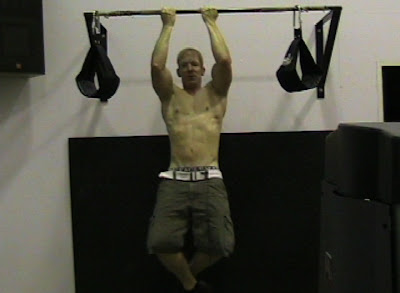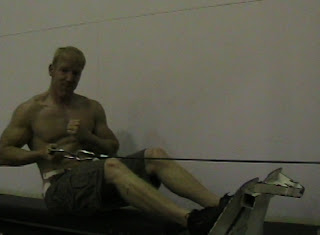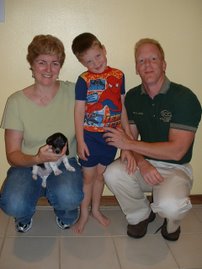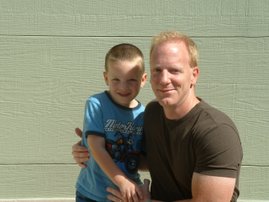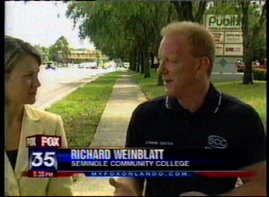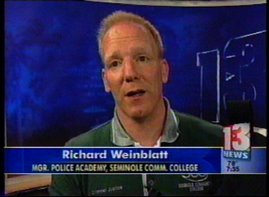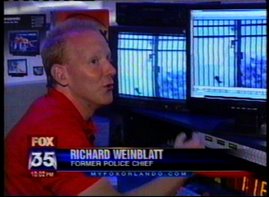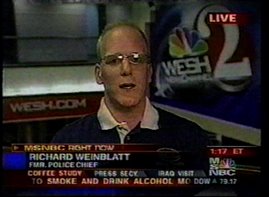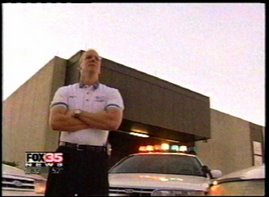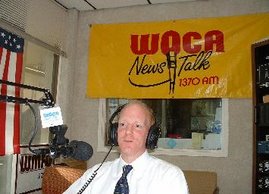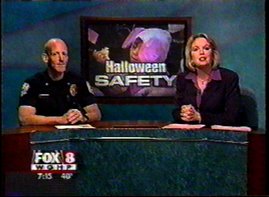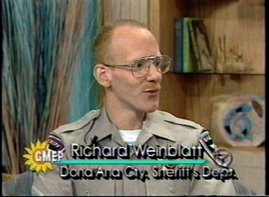Watching "Clash of the Dinosaurs" on Discovery Channel. Phenomenal program.
Tuesday, November 17, 2009
Orlando Office Building & Ft. Hood Shooter Situation: Excellent Police Response
The recent tragic office building shooting in Orlando, Florida, underscores my quick move to offer kudos to the Orlando Police Department in their quick response. Patrol officers were on scene in approximately one minute. As I explained in three live breaking news MSNBC TV interviews and the MSNBC.com website, as well as for local stations in Orlando, FL, (WESH 2 - NBC - News and Central Florida News 13) and Columbus, OH, (WCMH NBC 4 News), first responding patrol officers moved quickly and may have moved the shooter to leave sooner than he originally intended. They exemplified what we want to see in our law enforcers in times of crisis: brave decisive action backed by training and experience. When others run away, these men and women lived up to their oaths and ran towards the danger zone.
I detailed too quite a few show bookers, producers, news anchors and reporters, law enforcement response to active shooter situations changed historically at the Columbine High School incident in Colorado. As many will recall, that situation saw first responding patrol officers standing by waiting for SWAT team officers. Meanwhile, students were being shot and the gunmen moved through the structure unfettered.
Law enforcement trainers took a hard look at response tactics in those situations and a new approach was born that was used in Orlando, as as well in the Ft. Hood shooting in Texas. The idea is to have first responding patrol officers form small, mobile teams to dynamically and aggressively move towards the sound of gunfire or where the perceived threat may be. Along the way, they encounter people who they shoo behind them towards hopefully other arriving teams of officers. I'm not detailing the formations of these teams or other tactical details that could compromise the officers and the public.
I was involved in this training when it started and evolved. I found it to be an effective means to, in our parlance, neutralize the threat. It is training that is grounded in much thought and research. I know this training and I know the law enforcement agencies involved in the Florida response. Since I ran an Orlando-area Police Academy at Seminole Community College, I trained many of the men and women that responded on November 6, 2009.
The Orlando Police Department, as well as the Orange County Sheriff's Office, are known for their unusual proficiency via a bunch of training hours and resources devoted to this method. Jason Rodriguez, the Orlando shooter, picked the right part of the country (from my perspective) as the officers in Central Florida are among the best in the nation at this type of call for police service.
On a related note, for those who think that I am anti-law enforcement in my news interviews, you haven't watched more than a few of my interviews or visited my website (such as www.TheCopDoc.com). My recent stance on the excellent work of the Orlando Police Department certainly underscores that. Many of them are available for viewing on my youtube.com channel (http://www.youtube.com/user/richardweinblatt).
What is interesting is that I have a chorus of folks who feel that I only take the side of the po-po given my background in law enforcement. Both are far from the truth. Sometimes I side against law enforcement's actions in a particular matter. Other times, I defend their actions. And still other incidents I have taken a middle of the road neutral stance given that not enough facts were presented yet.
I let the facts speak for themselves and, coupled with my training, education, and experience, assess and communicate a professional opinion of complex justice issues in terms that are understandable. That has been a central part of my life's mission.
That my mission can help to highlight and explain the laudatory action of law enforcement officers in Orlando and Ft. Hood is particularly satisfying. Some of the TV news interviews are featured below.
Labels: Active, Ft. Hood, New Orleans Police, Orange County, Orlando, Richard Weinblatt, sheriff, Shooter
Monday, November 9, 2009
Back & Biceps Exercise Video: New Ideas for Law Enforcement & Others
New from The Cop Doc: Shot on location at the Advantage Club in Newark, Ohio (just East of Columbus, Ohio) for law enforcement folks and others looking for new approaches to their back and biceps workouts. I shot the video on Saturday night. I hope it will help people. Changing up your workout and muscle confusion is key to making progress towards your fitness goals. The video has been uploaded here at Blogger, as well on Facebook, MySpace, youtube, DailyMotion.com, Veoh.com, Break.com, PoliceLink.com, and other websites.
In the video, I link the biceps as a followup to fellow "pulling" muscles: the back. I also stress the use of proper form and diet as essential to any workout program. I also touch on the concept of "super-setting" and "negatives" when I suggest doing a couple slow downward movement close grip pull-ups (or chin-ups) between each bicep exercise.
I also throw in some use of elastic bands with the sitting preacher curl. By wrapping the bands from each end of the curl bar to a corresponding dumbbell on the floor, you are able to keep the tension consistent even at the top of the curl motion.
Working out and a healthy lifestyle is vital for those in public safety and even for others in our society. I hope this video motivates and helps people. Let me know how it works for you.
Labels: Back, Bicep, Biceps, Exercise, Exercises, Gym, Richard Weinblatt, Shirtless, The Cop Doc, Workout
Tuesday, July 21, 2009
Harvard Professor Gates and Racial Profiling: Police Expert's Perspective

As a college criminal justice educator, police expert media commentator, and former police chief, I have commented extensively police situations and have done so before on everything from Taser to the Caylee Anthony case. In some cases I have defended officers on the scene and explained their perspective. But in others, I have eshewed the circle the wogon mentality. I call it for how I see it based on commonly accepted police practices and an eye on the big picture of policing in America.
The big story today: Professor Gates racial profiling case. I have read the Cambridge Police reports and have several thoughts on the matter.
Bottom line: while the officer was justified in investigating a crime, he stated in his report that he was satisfied that the occupant, Professor Gates, was legally allowed to be there and that no further danger was present. That, from a law enforcement perspective, is THE key phrase. It was at that point he should have left. This became a battle of competing egos.
I have walked away once my legal duty was done even with someone yelling. The courts have long ruled that people can yell at the police. Disorderly conduct is a stretch especially when you (order or ask) the person to step outside so that non-police folks can be exposed to that yelling and be "alarmed" as an element of disorderly conduct. Just the perception alone is bad.
We need to see the big picture in policing. Perception is reality. We as professionals need to be sensitive to other people and their reality. Here as Director of the Institute for Public Safety at Central Ohio Technical College (which includes the Basic Police Academies) and other places I've been before, we drive home the mantra of respect and understanding for other folks' perspectives.
While perhaps the Professor was overly agitated, it was the police presence that was creating the agitation. Remove the police presence, and the agitation is gone. This is not unlike the theory that Los Angeles Police and other police agencies are correctly gravitating to regarding police chases. Bring in a helicopter, stop chasing with ground units, and the fleeing driver will stop driving at the high rate of speed.
We in policing are supposed to be professional problem solvers. The courts have ruled that it is not illegal for officers to be called names. Doesn't make it pleasant, but it is part of the career of peace officer. We are supposed to deescalate situations even if it means walking away.
I even saw this a few years back while doing a ride along with constables of the London Metropolitan Police in the U.K. A marked police car I was riding in broke down. People riding by would give me and the two uniformed bobbies obscene genstures. The officers just laughed. They understood that it was not personal, just directed at the uniform. They also knew it was part of policing in a democratic society.
While I believe in officer discretion, I do not believe that it was executed wisely here. I feel that he should have seen that the big picture of what we do and why we are here was forgotten for the heat of the moment. We in law enforcement are supposed to be above that.
Having investigated numerous reported break ins in my career, having supervised and trained officers who do so, I can comment on accepted police practices at each stage in the call for police service and how the officer handled it based on his own report.
To say the least, this call was not handled well. My educated prediction is that the case against Professor Gates will go away. In the meantime, officers nationwide will have to contend with folks that have yet another seed of discontent with law enforcers. All because the big picture was not heeded here.
Officers, and I agree, are all about officer safety. Officer safety begins with respect and being a peace officer. Walking away when it is not worth it and the legal need to remain to investigate has been satisfied. That did not happen here.
Thursday, April 9, 2009
Police Expert on Traffic Stop of NFL Player Ryan Moats by Dallas Police Officer
Like many folks in the criminal justice and law enforcement education and practitioner arenas, I was distreessed to see the video of NFL player Ryan Moats with Dallas Police officer Robert Powell during a traffic stop. As many people saw on countless youtube and television replays, Mr. Moats was enroute to a hospital in Plano, Texas, to try to see his mother in law before she passed away. Mr. Moats had his hazard lights on and went through a red light garnering the attention of Officer Powell. The Dallas law enforcer pursued Mr. Moats into the hospital emergency room parking lot and detained him for 13 minutes of a heated exchange.
This was an upsetting situation and a blow for law enforcement in the eyes of the community. As a former police chief, former full-time patrol officer, and law enforcement educator/trainer, I view this as contrary to our role in society. I made a video with my views on the situation. That video is featured here below on Blogger, as well as posted on my youtube.com, Facebook.com, Google Video, MySpace.com, Break.com, LiveLeak.com, Seesmic.com, Vimeo.com, Veoh.com, and DailyMotion.com pages. And I see that it has already been picked up by video sites in Asia and elsewhere.
The events as they transpired in the Moats traffic stop were just plain wrong. At the police academy I used to teach in and manage, just North of Orlando in Central Florida, I exhorted the students to remember what it was like before they pinned the badge. I told them to treat people as they would want their mother, father, brother, sister, wife, husband, boyfriend, girlfriend, etc. to be treated.
The Moats family was in crisis. We are trained to handle people in crisis. As the mature, professional police officer, it is part of the job to deescalate situations and to see the big picture of what is happening. A simplistic view that is black and white (no pun intended here) is not the right path. This was a shade of grey.
To view this as simply go through light and get ticket is not right. Was the Moats family animated? Yes. So was the officer. Any veteran knows that yelling and being disrespectful only breeds more of the same from the motorist or civilian we are interacting with. If someone is agitated, we need to figure out why and calm them down.
If we as a society believe in simple cause an effect in terms of offense and punish, than we should do away with traffic officers and only have robotic, automatic red light cameras everywhere. But clearly we don't all agree that the camera route is the path to take. We need human beings as officers to deal with their fellow humans with compassion. Discretion is a key word here. We legally grant officers that latitude for a reason. It needs to exercised wisely.
Clearly, this was not the case of a lying motorist (which we all run into all to often). A nurse came out twice and a uniformed Plano Police officer came out once pleading for the Dallas Police officer to release Mr. Moats so he could see his mother in law before she passed away. Tragically, that did not happen.
In Florida and other states, you can mail the ticket. I commented on a similiar stoty for the news media a couple years ago involving a Hillsborough County Sheriff's Office Deputy Sheriff in Tampa, Florida, and offered the same solution.
This is also a tragedy for the Powell family (wife and kids too). A young officer has lost his career for what may be an unusual behavior. I have not obviously seen his personnel file, nor am I in the internal affairs/professional standards unit of the Dallas Police Department.
If it is a one-time occurence, and his apology and resignation is genuine, than I hope he learned and gets another position at a good, reputable law enforcement agency. If not, than it is better that he be doing something else. The stakes are too high in law emnforcement. We are not allowed to have a bad day. When we have a bad day, people can die.





